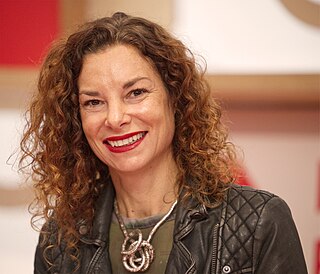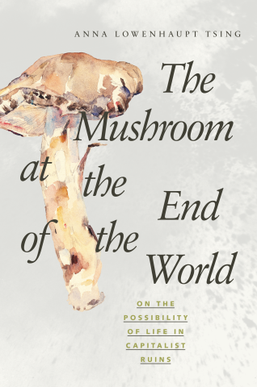
Edward Osborne Wilson was an American biologist, naturalist, ecologist, and entomologist known for developing the field of sociobiology.

Human ecology is an interdisciplinary and transdisciplinary study of the relationship between humans and their natural, social, and built environments. The philosophy and study of human ecology has a diffuse history with advancements in ecology, geography, sociology, psychology, anthropology, zoology, epidemiology, public health, and home economics, among others.

Carolyn Merchant is an American ecofeminist philosopher and historian of science most famous for her theory on The Death of Nature, whereby she identifies the Scientific Revolution of the seventeenth century as the period when science began to atomize, objectify, and dissect nature, foretelling its eventual conception as composed of inert atomic particles. Her works are important in the development of environmental history and the history of science. She is Distinguished Professor Emerita of Environmental History, Philosophy, and Ethics at UC Berkeley.
The Anthropocene was a rejected proposal for a geological epoch following the Holocene, dating from the commencement of significant human impact on Earth up to the present day. This impact affects Earth's oceans, geology, geomorphology, landscape, limnology, hydrology, ecosystems and climate. The effects of human activities on Earth can be seen for example in biodiversity loss and climate change. Various start dates for the Anthropocene have been proposed, ranging from the beginning of the Neolithic Revolution, to as recently as the 1960s. The biologist Eugene F. Stoermer is credited with first coining and using the term anthropocene informally in the 1980s; Paul J. Crutzen re-invented and popularized the term. However, in 2024 the International Commission on Stratigraphy (ICS) and the International Union of Geological Sciences (IUGS) rejected the Anthropocene Epoch proposal for inclusion in the Geologic Time Scale.
Global change in broad sense refers to planetary-scale changes in the Earth system. It is most commonly used to encompass the variety of changes connected to the rapid increase in human activities which started around mid-20th century, i.e., the Great Acceleration. While the concept stems from research on the climate change, it is used to adopt a more holistic view of the observed changes. Global change refers to the changes of the Earth system, treated in its entirety with interacting physicochemical and biological components as well as the impact human societies have on the components and vice versa. Therefore, the changes are studied through means of Earth system science.
Jedediah Spenser Purdy is an American legal scholar and cultural commentator. In 2022 he became the Raphael Lemkin Professor of Law at Duke University School of Law, where he teaches courses on Property and Past and Future of Capitalist Democracy. From 2018 to 2022 he was William S. Beinecke Professor of Law at Columbia Law School, teaching courses on American Constitutional Law, Constitutional Law and Democracy and its Crisis. He previously taught at Duke University School of Law from 2004 to 2018.
This timeline lists events in the external environment that have influenced events in human history. This timeline is for use with the article on environmental determinism. For the history of humanity's influence on the environment, and humanity's perspective on this influence, see timeline of history of environmentalism. See List of periods and events in climate history for a timeline list focused on climate.
Human overpopulation is the idea that human populations may become too large to be sustained by their environment or resources in the long term. The topic is usually discussed in the context of world population, though it may concern individual nations, regions, and cities.

Andrew C. Revkin is an American science and environmental journalist, webcaster, author and educator. He has written on a wide range of subjects including destruction of the Amazon rainforest, the 2004 Asian tsunami, sustainable development, climate change, and the changing environment around the North Pole. From 2019 to 2023 he directed the Initiative on Communication and Sustainability at The Earth Institute of Columbia University. While at Columbia, he launched a video webcast, Sustain What, that seeks solutions to tangled environmental and societal challenges through dialogue. In 2023, the webcast integrated with his Substack dispatch of the same name.

Planetary boundaries are a framework to describe limits to the impacts of human activities on the Earth system. Beyond these limits, the environment may not be able to self-regulate anymore. This would mean the Earth system would leave the period of stability of the Holocene, in which human society developed. The framework is based on scientific evidence that human actions, especially those of industrialized societies since the Industrial Revolution, have become the main driver of global environmental change. According to the framework, "transgressing one or more planetary boundaries may be deleterious or even catastrophic due to the risk of crossing thresholds that will trigger non-linear, abrupt environmental change within continental-scale to planetary-scale systems."

The Sixth Extinction: An Unnatural History is a 2014 non-fiction book written by Elizabeth Kolbert and published by Henry Holt and Company. The book argues that the Earth is in the midst of a modern, man-made, sixth extinction. In the book, Kolbert chronicles previous mass extinction events, and compares them to the accelerated, widespread extinctions during our present time. She also describes specific species extinguished by humans, as well as the ecologies surrounding prehistoric and near-present extinction events. The author received the Pulitzer Prize for General Non-Fiction for the book in 2015.
Dale Jamieson is Professor of Environmental Studies and Philosophy at New York University, a scholar of environmental ethics and animal rights, and an analyst of climate change discourse. He also serves as a faculty affiliate for the NYU School of Law and as director of NYU's Animal Studies Initiative, which was funded by Brad Goldberg with a $1 million donation in 2010. In addition to his affiliation with the NYU Departments of Environmental Studies and Philosophy, Jamieson also holds positions at The Dickson Poon School of Law and at the University of the Sunshine Coast in Australia.

Ecomodernism is an environmental philosophy which argues that technological development can protect nature and improve human wellbeing through eco-economic decoupling, i.e., by separating economic growth from environmental impacts.

Gaia Vince is a freelance British environmental journalist, broadcaster and non-fiction author with British and Australian citizenship. She writes for The Guardian, and, in a column called Smart Planet, for BBC Online. She was previously news editor of Nature and online editor of New Scientist.

Jo-Anne McArthur is a Canadian photojournalist, humane educator, animal rights activist and author. She is known for her We Animals project, a photography project documenting human relationships with animals. Through the We Animals Humane Education program, McArthur offers presentations about human relationships with animals in educational and other environments, and through the We Animals Archive, she provides photographs and other media for those working to help animals. We Animals Media, meanwhile, is a media agency focused on human/animal relationships.

Erle Christopher Ellis is an American environmental scientist. Ellis's work investigates the causes and consequences of long-term ecological changes caused by humans at local to global scales, including those related to the Anthropocene. As of 2015 he is a professor of Geography and Environmental Systems at the University of Maryland, Baltimore County where he directs the Laboratory for Anthroecology.
Planetary health is a multi- and transdisciplinary research paradigm, a new science for exceptional action, and a global movement. Planetary health refers to "the health of human civilization and the state of the natural systems on which it depends". In 2015, the Rockefeller Foundation–Lancet Commission on Planetary Health launched the concept which is currently being developed towards a new health science with over 25 areas of expertise.

The Stockholm Resilience Centre (SRC), is a research centre on resilience and sustainability science at Stockholm University. It is a joint initiative between Stockholm University and the Beijer Institute of Ecological Economics at the Royal Swedish Academy of Sciences.

The Mushroom at the End of the World: On the Possibility of Life in Capitalist Ruins is a 2015 book by the Chinese American anthropologist Anna Lowenhaupt Tsing. The book describes and analyzes the globalized commodity chains of matsutake mushrooms.

The Anthropocene Reviewed is the shared name for a podcast and 2021 nonfiction book by John Green. The podcast started in January 2018, with each episode featuring Green reviewing "different facets of the human-centered planet on a five-star scale". The name comes from the Anthropocene, the proposed geological epoch that includes significant human impact on the environment. Episodes typically contain Green reviewing two topics, accompanied by stories on how they have affected his life. These topics included intangible concepts like humanity's capacity for wonder, artificial products like Diet Dr. Pepper, natural species that have had their fates altered by human influence like the Canada goose, and phenomena that primarily influence humanity such as Halley's Comet.













